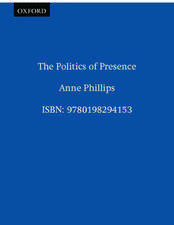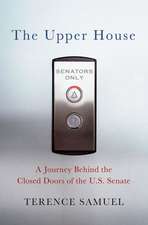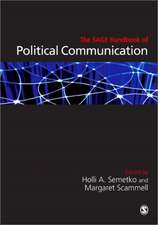Beyond Ideology: Politics, Principles, and Partisanship in the U. S. Senate
Autor Frances E. Leeen Limba Engleză Paperback – dec 2009
The congressional agenda, Frances Lee contends, includes many issues about which liberals and conservatives generally agree. Even over these matters, though, Democratic and Republican senators tend to fight with each other. What explains this discord? Beyond Ideology argues that many partisan battles are rooted in competition for power rather than disagreement over the rightful role of government.
The first book to systematically distinguish Senate disputes centering on ideological questions from the large proportion of them that do not, this volume foregrounds the role of power struggle in partisan conflict. Presidential leadership, for example, inherently polarizes legislators who can influence public opinion of the president and his party by how they handle his agenda. Senators also exploit good government measures and floor debate to embarrass opponents and burnish their own party’s image—even when the issues involved are broadly supported or low-stakes. Moreover, Lee contends, the congressional agenda itself amplifies conflict by increasingly focusing on issues that reliably differentiate the parties. With the new president pledging to stem the tide of partisan polarization, Beyond Ideology provides a timely taxonomy of exactly what stands in his way.
The first book to systematically distinguish Senate disputes centering on ideological questions from the large proportion of them that do not, this volume foregrounds the role of power struggle in partisan conflict. Presidential leadership, for example, inherently polarizes legislators who can influence public opinion of the president and his party by how they handle his agenda. Senators also exploit good government measures and floor debate to embarrass opponents and burnish their own party’s image—even when the issues involved are broadly supported or low-stakes. Moreover, Lee contends, the congressional agenda itself amplifies conflict by increasingly focusing on issues that reliably differentiate the parties. With the new president pledging to stem the tide of partisan polarization, Beyond Ideology provides a timely taxonomy of exactly what stands in his way.
Preț: 245.75 lei
Nou
Puncte Express: 369
Preț estimativ în valută:
47.02€ • 49.00$ • 38.94£
47.02€ • 49.00$ • 38.94£
Carte tipărită la comandă
Livrare economică 04-18 aprilie
Preluare comenzi: 021 569.72.76
Specificații
ISBN-13: 9780226470764
ISBN-10: 0226470768
Pagini: 264
Ilustrații: 29 line drawings, 24 tables
Dimensiuni: 152 x 229 x 15 mm
Greutate: 0.34 kg
Editura: University of Chicago Press
Colecția University of Chicago Press
ISBN-10: 0226470768
Pagini: 264
Ilustrații: 29 line drawings, 24 tables
Dimensiuni: 152 x 229 x 15 mm
Greutate: 0.34 kg
Editura: University of Chicago Press
Colecția University of Chicago Press
Notă biografică
Frances Lee is associate professor in the Department of Government and Politics at the University of Maryland.
Cuprins
List of Figures
List of Tables
Acknowledgments
Chapter 1. Ties That Bind: Untangling the Roots of Congressional Partisanship
Chapter 2. Before “Ideology”: A Conceptual History
Chapter 3. Sources of Party Conflict: Ideological Disagreement and Teamsmanship
Chapter 4. Dividers, Not Uniters: Presidential Leadership and Legislative Partisanship
Chapter 5. The Partisan Politics of Good Government
Chapter 6. Procedural Partisanship: Intra-Party Dealmaking and Partisan Bloc Voting
Chapter 7. Agreeing to Disagree, or Disagreeing to Agree: Agenda Content and Rising Partisanship
Chapter 8. Beyond Ideology: Returning to Politics
Appendix A. Coding the Presidential Agenda Status of Roll-Call Votes
Appendix B. Does Party Polarization on an Issue Topic Increase the Likelihood That Presidents Will Include the Issue on Their Agenda?
Appendix C. Estimates of Multinomial Logit Model of Partisan Voting Patterns on Senate Roll-Call Votes, 1981–2004
Notes
References
Index
List of Tables
Acknowledgments
Chapter 1. Ties That Bind: Untangling the Roots of Congressional Partisanship
Chapter 2. Before “Ideology”: A Conceptual History
Chapter 3. Sources of Party Conflict: Ideological Disagreement and Teamsmanship
Chapter 4. Dividers, Not Uniters: Presidential Leadership and Legislative Partisanship
Chapter 5. The Partisan Politics of Good Government
Chapter 6. Procedural Partisanship: Intra-Party Dealmaking and Partisan Bloc Voting
Chapter 7. Agreeing to Disagree, or Disagreeing to Agree: Agenda Content and Rising Partisanship
Chapter 8. Beyond Ideology: Returning to Politics
Appendix A. Coding the Presidential Agenda Status of Roll-Call Votes
Appendix B. Does Party Polarization on an Issue Topic Increase the Likelihood That Presidents Will Include the Issue on Their Agenda?
Appendix C. Estimates of Multinomial Logit Model of Partisan Voting Patterns on Senate Roll-Call Votes, 1981–2004
Notes
References
Index










